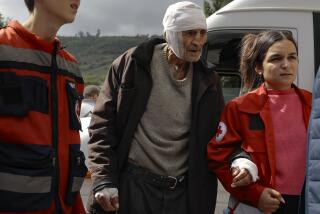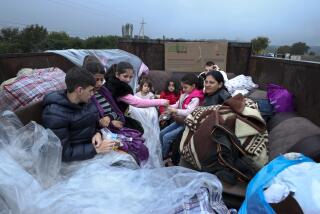Soviet Enclave Declares Independence
- Share via
NICOSIA, Cyprus — The ruling council of the Azerbaijani enclave of Nakhichevan declared independence Saturday from the Soviet Union and called for international protection, according to an Iranian news agency report later confirmed by officials in Moscow.
Iran’s IRNA news agency, monitored in Cyprus, said the declaration of the Nakhichevan Autonomous Republic called on Turkey, Iran and the United Nations to secure its territorial integrity. The report quoted the statement as demanding the withdrawal of Soviet troops from the 2,200-square-mile enclave, which bears the same name as its capital city.
According to the IRNA report, a Nakhichevan television station broadcast the announcement shortly after midnight. It was delivered by Sakina Ali-Ava, identified as head of the region’s Presidium.
The IRNA report quoted her as declaring that the announcement of independence was taken in accordance with the Soviet constitution and that it was proclaimed “due to the lack of defense for the territorial integrity of Azerbaijan and Nakhichevan and the creation of a state of terror following the aggressions of Armenians.”
The announcement, which followed a broadcast of martial music, appealed for outside powers to “prevent a massacre of the people” in the capital city, the scene of clashes between Soviet Azerbaijanis and the Armenian minority early this month.
In Moscow, First Deputy Foreign Minister Alexander A. Bessmertnykh told reporters that the announcement declared secession from both the Azerbaijan republic and the Soviet Union. He argued that the decision violated the constitution, which, he said, requires an autonomous enclave to receive approval of the superior republic to secede.
Nakhichevan is a small enclave of 250,000 people, mainly Muslims. Located about 220 miles southwest of Baku and bordering Iran, Turkey and the Soviet republic of Armenia, it has been under Azerbaijan’s jurisdiction since 1924.
It also has been a hot spot of the current turmoil. Friday’s editions of the Soviet daily Izvestia reported that Iranian Azerbaijanis, who share the same language and Shiite Muslim faith as their Soviet compatriots, had supplied weapons to Azerbaijanis north of the border. Moscow reports quoted Izvestia as saying thousands of Azerbaijanis had been crossing the border in both directions in recent days.
More than 5 million Azerbaijanis live in Iran, and 6.8 million live in Soviet Azerbaijan.
Earlier this month, angry Nakhichevan residents, seeking closer ties with Iran, destroyed about 120 miles of frontier fortifications. And on Friday, according to IRNA, large numbers of Soviet Muslims had crossed the border in the Nakhichevan area to attend Muslim prayer services in Iran and staged a demonstration in support of the Ayatollah Ali Khamenei, Iran’s Shiite spiritual leader.
The Iranian government took a cautious stance as the disturbances flared earlier this month along its northern border west of the Caspian Sea. “Iran on her part,” said Mahmoud Vaezi, a deputy foreign minister, “has no penchant for taking advantage of the U.S.S.R.’s domestic problems and the pressures mounting on Moscow by ethnic crises, especially in the southern republics. Iran is no political opportunist, neither is it after a change in the present border lines between the two countries.”
This week, however, Khamenei raised the Islamic issue, declaring that Muslim Azerbaijanis were expressing sectarian values after long decades of suppression of religion under the Soviet system. “These sentiments are Islamic and have their attractions for 1 billion Muslims worldwide,” he said.
And on Saturday, IRNA published a statement by the Foreign Ministry calling on Moscow to settle the crisis in Azerbaijan by peaceful means and “stop its violence against the people.”
The IRNA report, monitored by the British Broadcasting Corp. in London, quoted the Tehran statement as saying:
“Iran’s Foreign Ministry expresses deep regret . . . and seriously wants the Soviet government to halt violent encounters with the people of Azerbaijan and resolve the issue by employing peaceful means.”
Times staff writer Masha Hamilton, in Moscow, contributed to this story.
More to Read
Sign up for Essential California
The most important California stories and recommendations in your inbox every morning.
You may occasionally receive promotional content from the Los Angeles Times.










